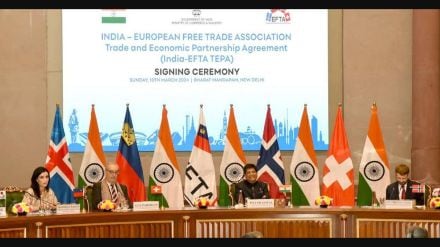India’s bilateral free trade agreement with the four-nation European Free Trade Association (EFTA) will come into force today, where major gains for India would be through investment commitments and service-sector access in return for preferential access to its markets for goods.
The agreement with EFTA – which includes Switzerland, Iceland, Norway and Liechtenstein – was signed on March 10, 2024; it’s officially called Trade and Economic Partnership Agreement (TEPA).
The biggest trade partner of India in the bloc, Switzerland, already has zero duties on industrial products so the additional concessions to India can be provided only in agriculture commodities and services.
What did Anant Swarup say?
“India stands to benefit most in sectors like pharmaceuticals, organic chemicals, food processing, engineering goods, IT services, and professional services,” Senior Advisor Trade Policy EY India Anant Swarup said.
Beyond tariffs and trade, the EFTA countries have agreed to invest $ 100 billion in India over the next 15 years with $ 50 billion in the first 10 years and another $ 50 billion in the subsequent five. This investment has to be as Foreign Direct Investment (FDI) that created 1 million direct jobs in India. Portfolio investments are out of this commitment. In case the investment commitments are not met that India can claw back concessions.
Broadly speaking, the EFTA will offer 92.2% of tariff lines which covers 99.6% of India’s exports. The EFTA’s market access offer covers 100% of non-agri products and tariff concession on Processed Agricultural Products (PAP).
India offers 82.7% of its tariff lines, which covers 95.3% of EFTA exports, of which more than 80% import is Gold. The effective duty on Gold remains untouched.
“The total annual EFTA imports (goods and services) is estimated at around $430 billion, with India’s current share of this market still modest highlighting substantial growth potential,” Swaroop said.
“The agreement is also expected to have a positive impact on Indian exports such as fish and other marine products and certain industrial products,’ Director- Regulatory Nangia & Co LLP Mayank Arora added.
What does the agreement say about labour market testing?
India’s sensitivity related to PLI in sectors such as pharma, medical devices and processed food have been taken while extending offers in TEPA. Sectors such as dairy, soya, coal and sensitive agricultural products are kept in the exclusion list.
In services the TEPA says that the parties to the agreement shall not require labour market testing and economic needs testing as a condition for entry and temporary stay with respect to natural persons covered by their specific commitments.
Labour market testing requires companies hiring overseas talent to show that local resources were not available to fill those jobs. The economic needs test assesses whether domestic suppliers can meet the demand and if not evaluates potential negative impact of allowing foreign entry.
Comprehensive information on the criteria and procedures for entry, temporary stay and work, and compliance with immigration laws and regulations applicable to entry, temporary stay and work will be established by both sides.
The agreement also has the provision where a service supplier has ways and means to request the recognition of its education or experience obtained, requirements met, or its licences or certifications granted, in the territory of another party.
Through clear provision in movement of service providers, TEPA would stimulate India’s services exports in sectors such as IT services, business services, personal, cultural, sporting and recreational services, other education services and audio-visual services, officials say.
“On the services front, financial services entities in EFTA states would be the biggest beneficiaries as TEPA shall facilitate the process for obtaining licenses to operate in the Indian market. The limitation of foreign capital will be uplifted in the banking sector from 51% to 74%,” Arora said.
TEPA also provides an opportunity to integrate into EU markets. Over 40% of Switzerland’s global services exports are to the European Union. Indian companies can look to Switzerland as a base for extending its market reach to the EU.
